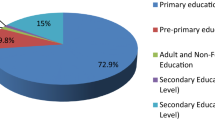Abstract
Over the last 20 years education policies in Cambodia have been driven by the global Education for All (EFA) campaign and have resulted in a rapid increase in the rates of primary education enrolment. However, the increasing number of children enrolling in schools has not always translated into high rates of primary education completion. Against this background the authors argue that while teachers play a significant role in keeping children in school and helping them to progress further in the education system, that role has been somewhat sidelined in the main debates about achieving EFA. They suggest that, while genuine problems exist with the qualifications and motivation of many Cambodian teachers, positive results could come from emphasizing their roles in achieving the wider goals of the education system and society, and thus promoting their active participation in furthering EFA.
Similar content being viewed by others
References
Akiba, M., LeTendre, G. K., & Scribner, J. P. (2007). Teacher quality, opportunity gap and national achievement in 46 countries. Educational Researcher, 36(7), 369–387.
Bennell, P., & Akyeampong, K. (2007). Motivation of teachers in sub-Saharan Africa and South Asia: Researching the issues. London: DFID.
Benveniste, L., Marshall, J., & Caridad Araujo, M. (2008). Teaching in Cambodia. Washington, DC: World Bank.
Bunlay, N., Wright, W. E., Sophea, H., Bredenburg, K., & Singh, M. (2009). Active-learning pedagogies as a reform initiative: The case of Cambodia (EQUIP1 research report). Washington, DC: American Institute for Research.
CESSP [Cambodia Education Sector Support Project] (2006, September). Baseline survey 2006: Lower secondary schooling in Cambodia. Phnom Penh: Sapere. http://www.sapere.org/CambodiaData.htm.
Chaudhury, N., Hammer, J., Kremer, M., Muralidharan, K., & Rogers, F. (2006). Missing in action: Teacher and health worker absence in developing countries. Journal of Economic Perspectives, 20(1), 91–116.
Craig, H., du Plessis, J., & Kraft, R. (1998). Teacher development: Making an impact. Washington, DC: Academy for Educational Development.
Gopinathan, S. (2006). Challenging the paradigm: Notes on developing an indigenized teacher education curriculum. Improving Schools, 9(3), 261–272.
Kiljunen, K. (Ed.). (1984). Kampuchea: The decade of the genocide. Report of a Finnish inquiry commission . London: Zed Books.
Kim, C.-Y. (2007). Investigating educational policy responses to children’s work: Views and approaches in the Cambodian education sector. Unpublished doctoral thesis, University of Cambridge, Cambridge.
Kim, C.-Y. (2009). Is combining child labour and school education the right approach? Investigating the Cambodian case. International Journal of Educational Development, 29(1), 30–38.
Kim, C.-Y. (2011). Child labour, education policy and governance in Cambodia. International Journal of Educational Development, 31(5), 490–498.
Kingdom of Cambodia (2007). The law on education. Enacted by the National Assembly on 19 October 2007 and approved by the Senate on 21 November 2007. Phnom Penh: Kingdom of Cambodia. http://planipolis.iiep.unesco.org/upload/Cambodia/Cambodia_Education_Law.pdf.
Liston, D., Borko, H., & Whitcomb, J. (2008). The teacher educator’s role in enhancing teacher quality. Journal of Teacher Education, 59(2), 111–116.
Marshall, J., Chinna, U., Nessay, P., Hok, U. N., Savoeun, V., Tinon, S., et al. (2009). Student achievement and education policy in a period of rapid expansion: Assessment data evidence from Cambodia. International Review of Education, 55, 393–413.
MoEYS (2001). Education indicators 2000–2001. Phnom Penh: MoEYS.
MoEYS (2002). Education indicators 2001–2002. Phnom Penh: MoEYS.
MoEYS (2003). Education indicators 2002–2003. Phnom Penh: MoEYS.
MoEYS (2004). Education indicators 2003–2004. Phnom Penh: MoEYS.
MoEYS (2005a). Education strategic plan 2006–2010. Phnom Penh: MoEYS.
MoEYS (2005b). Education sector support program 2006–2010. Phnom Penh: MoEYS.
MoEYS (2005c). Education indicators 2004–2005. Phnom Penh: MoEYS.
MoEYS (2006a). Child-friendly schools (CFS) in Cambodia. Phnom Penh: MoEYS.
MoEYS (2006b). Education indicators 2005–2006. Phnom Penh: MoEYS.
MoEYS (2007a). Education indicators 2006–2007. Phnom Penh: MoEYS.
MoEYS (2007b). National child friendly school policy. Phnom Penh: MoEYS.
MoEYS (2008). Education indicators 2007–2008. Phnom Penh: MoEYS.
MoEYS [Ministry of Education, Youth, Sports] (2000). Education indicators 1999–2000. Phnom Penh: MoEYS.
NEP and VSO [NGO Education Partnership and Voluntary Service Overseas] (2008, December). Teaching matters: A policy report on the motivation and morale of teachers in Cambodia. Phnom Penh: NGO Education Partnership and VSO.
Oro, M. (2008). Training needs assessment of in-service primary and lower secondary teachers in six provinces in Cambodia. Phnom Penh: MoEYS, Teacher Training Department.
Ovington, G., Geeves, R., Horie, Y., & Sokhak, H. (2003). Schools of hope: Community-focused partnerships in recent conflict areas in Siem Reap, Cambodia. Phnom Penh: Save the Children Norway.
Samoff, J. (1999). Institutionalizing international influence: The context for educational reform in Africa. In M. Samuel, J. Perumal, R. Dhunpath, J. Jansen, & K. Lewin (Eds.), International trends in teacher education: Policy, politics and practice (pp. 5–35). Durban: Faculty of Education, University of Durban-Westville.
Tomasevski, K. (2004). Manual on rights-based education: Global human rights requirements made simple. Bangkok: UNESCO Bangkok, Asia and Pacific Regional Bureau for Education.
UIS [UNESCO Institute for Statistics] (2006). Teachers and educational quality: Monitoring global needs for 2015. Montreal: UIS.
UNESCO (2004). EFA global monitoring report 2005: Education for All, the quality imperative. Paris: UNESCO.
UNESCO (2010). EFA global monitoring report 2010: Reaching the marginalized. Oxford: Oxford University Press.
UNICEF (2008). The state of the worlds’ children 2008: Child survival. New York: UNICEF.
World Bank (2002, April). EFA: The lesson of experience. The impact of policy in 20 case studies. Report prepared for the accelerating action towards the Education for All (EFA) conference, Amsterdam.
World Bank (2005, January). Cambodia quality basic Education for All. Washington, DC: World Bank, Human Development Sector, East Asia and the Pacific Region.
Zeichner, K., & Ndimande, B. (2008). Contradictions and tensions in the place of teachers in educational reform: Reflections on teacher preparation in the USA and Namibia. Teachers and Teaching: Theory and Practice, 14(4), 331–343.
Author information
Authors and Affiliations
Corresponding author
About this article
Cite this article
Kim, CY., Rouse, M. Reviewing the role of teachers in achieving Education for All in Cambodia. Prospects 41, 415–428 (2011). https://doi.org/10.1007/s11125-011-9201-y
Published:
Issue Date:
DOI: https://doi.org/10.1007/s11125-011-9201-y




